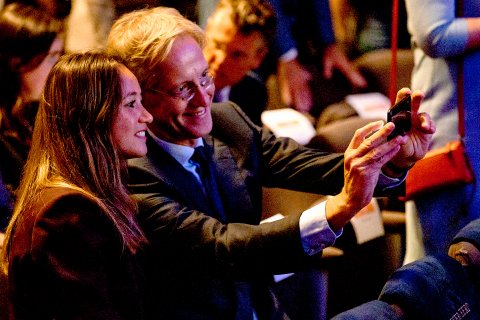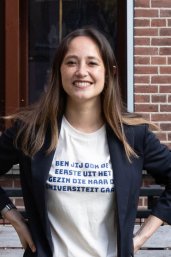Made possible
Money worries shouldn't impact on your studies

It wasn’t that they said at home ‘Don’t go to university’. It's just that no one really had the knowledge or the experience; I didn't have any role models around me.
These are the words of Charisma Hehakaya (31). She was the first person in her family to go to university. And there were social and financial problems at home, too,
she continues. When I started studying for my Bachelor’s in Science, Business & Innovation back in 2012, I found it difficult keeping all the balls in the air. I found reading documents difficult, for example. My Dutch wasn’t good at all. I was brought up bilingual: in Mollucan and Dutch. I failed a compulsory test in the Dutch language twice. I also had to get used to how you study, irrespective of the content. I also had to work a lot to pay for everything: healthcare insurance, tuition fees, laptop, books and just my day-to-day living expenses. It took me some time to find that balance. I hardly ever met a student who was going through the same things as I was and for a long time I felt like an outsider.
Charisma wants to remove financial barriers for other first-generation students so they can focus on their own development. This inspired her to set up the First-Generation Fund in 2021.

Dr Charisma Hehakaya was herself a first-generation student and is the founder of the First-Generation Fund and the University Pioneers Community. She is committed to fighting inequality of opportunity in education, science and healthcare. Charisma obtained a PhD in 2023 from the Imaging and Oncology division of UMC Utrecht. She is assistant professor in the Global Public Health & Bioethics department at UMC Utrecht and is active in Exposome-NL. She is working on how information on living environment and lifestyle can be collected and translated into useful information and implementation strategies.
“It’s not just about content”
Charisma now has three master’s degrees and has graduated with a PhD from the Imaging and Oncology department of UMC Utrecht. She conducted research into the implementation and evaluation of a technology that should eventually enable more targeted tumour treatment with fewer side effects. All those degree programmes are great, of course, but it's not just about the content of what you study. I learned a lot than that over the course of my studies, and I realise that's been a great opportunity. When I was on the point of finishing my PhD, I decided it was time to give something back. I looked at the support provided for first-generation students at Utrecht University. It was all pretty fragmented and not specifically aimed at this group of students, even though first-generation students have more financial challenges and other barriers to contend with. This can affect how at home they feel at university. And first-generation students often aren't really inclined to ask for help because they are often used to finding things out for themselves, even though they do deserve extra attention. My aim with the First-Generation Funds is mainly to encourage these students to make the most of their talents. What I have noticed is that they are good at translating theory into practice and connecting different worlds.
"My goal is a long-term fund"
Charisma is using the crowdfunding platform of the University Fund to raise 100,000 euros over a two-year period. The fund has already raised more than 67,000 euros. The aim is to create a long-term fund the return from which can be used to award grants. I’m delighted with the result so far! All the money we raise will go towards material support for students. In just over a year we have already been able to help more than twenty students purchase books or a laptop, with language training or a stay at a university abroad.
It was with good reason that, in March this year, Charisma won the Diversity & Inclusion Award 2023.
I think it’s really important that people are more aware of this issue and I really enjoy doing this because I think it’s important. It’s great to see how you can give students more opportunity to focus on their studies. I've also been lucky enough to get help from Caroline van de Beek of the University Fund. I also have a group of ambassadors: first-generation students, staff and other students who help promote the fund in their own faculties. I believe that raising awareness among staff and students is very important. That’s why I also launched the University Pioneers Community, a mentoring programme that we want to use to link existing initiatives together. First-generation students deserve support! That way education will be more accessible for all.
Help us!
The First-Generation Fund helps students for whom going to university is not an assumption. The aim is to ensure that they have fewer financial worries and feel more at home at university. The fund not only provides grants but also shares students’ stories. Would you like to help us establish it as a long-term fund? Through our crowdfunding page it’s easy to make a one-off payment or set up a regular ongoing donation.
University Pioneers Community
First-generation students are pioneers. They were one of the first people in their family to go to university. They bridge gaps on their own and bring worlds together in the process. University Pioneers (UP) Community is a platform for and by people who are or have been first-generation students. The programme helps these students navigate their way around student life and encourages them to make the most of their talents. UP also wants to highlight the unwritten rules that often unintentionally apply at university. First-generation students can choose for themselves which facilities they wish to take advantage of. For example, you can choose to have a mentor but you can also just come along to activities. The community provides a network and opportunities for development. You will not be a participant, you will be a member of the community. Membership of UP is free of charge and can easily be combined with membership of a student or study association.
Want to find out more or to share your ideas? Check out universitypioneers.sites.uu.nl/over-up-community or email universitypioneers@uu.nl

